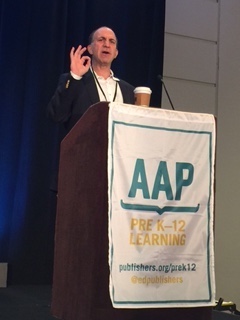‘Class Clowns’ Author to Ed. Publishers: Forget ‘Revolution’ Talk and Keep Focused
Philadelphia
Successful businesses in K-12 schools are not trying to create a revolution in education, Jonathan Knee told a gathering of more than 200 education executives here Thursday.
“Whenever you hear somebody use the word ‘revolution,’ run,” advised Knee, author of Class Clowns: How the Smartest Investors Lost Billions in Education, and the keynote speaker at a conference of the Association for American Publishers’ PreK-12 learning group this week.
“Failed business models have this idea that came from something—they think they can rip out what was there before,” said Knee, who is a Columbia Business School professor and investment banker.

To be successful, an education business must be focused, grasp the concept of “scale,” and understand that content is not king, he said.
“The great businesses start by dominating something very focused and particular, then moving out to the next semicircle,” he said. By leveraging each expansion in that concentrated way, they succeed, he said.
Knee used the story of Rupert Murdoch’s loss of $1 billion for shareholders in his foray into education as an example of the missteps businesses make. Murdoch’s purchase of Wireless Generation and the creation of Amplify Education as a subsidiary of News Corp. is a cautionary tale, said Knee at the publishers association’s 2017 Content in Context conference.
“Successful businesses are focused. Conglomerates do less well,” he said. Amplify, under the leadership of Murdoch and Joel Klein, the former chancellor of New York City schools, was trying to launch a curriculum-on-a-computer business that failed.
Over the last decade in public markets, companies that have created the most value have focused on what they do well, and divested themselves of business units that did not fit that definition, Knee said.
Focus is also essential for company leaders, who often fail to recognize the consequences of taking on work that saps management’s time and energy, he said. “If you’re doing too many things, it’s a scarce resource that gets frittered away,” said Knee.
With Amplify, “for whatever reason—in pursuit of revolution—they would not only try to bring down the traditional…curriculum publishers and create content, but at the same time take on Apple and hardware manufacturers, and…software [makers], because those people don’t know what the hell they’re doing, and also go into the gaming market.”
Murdoch spent $360 million in 2010 to buy a “cash flow-negative business whose revenue had declined in the previous year, but was a leader in its segment, which was formative assessment in K-3…to take on Apple and Oracle and Pearson, is not intuitively obvious,” Knee said. [Amplify was sold in 2015 to 11 executives. Joel Klein, who was originally identified by the company as being part of the transition, is not an investor in Amplify and did not join the board of the spun-off company. Instead, he became chief policy and strategy officer at Oscar Health in 2016.]
By going back to its core business and focusing on specific grade and subjects, Amplify is now “continuing to grow on the formative piece, and to the extent they succeed, it will be because they narrowed their focus,” he said.
The second mistake that Knee said News Corp.’s education business made was confusing the concept of scale. Acknowledging that scale is “critical to competitive advantage,” it does not exclusively equate to size.
“You can get bigger and decrease your scale,” said Knee. When Murdoch bought Wireless Generation, it “had scale at formative assessment,” but adding more business activities–while enlarging the enterprise, made that scale go from high to low.
The third “core fallacy,” which is shared by many in the education and entertainment industries, is that “content is king,” he said. Creating content is necessary but expensive, and the costs of developing it need to be balanced with expectations for return on investment. Knee gave the example of Netflix CEO Reed Hastings, whom he said spends $6 billion a year creating original series. “You’ve heard of ‘House of Cards?’ asked Knee. “He’s financed 30 [series], and 27 of them you’ve never heard of.”
Knee emphasized the need for education companies to continue finding paths to be successful. Every educational system in the world is made up of some mixture of the for-profit, not-for-profit and public sectors, he said.
“Successful, for-profit businesses provide a pillar of continuity in an otherwise volatile environment,” he argued, “which is why your obligation is to run good, stable, sustainable businesses.”
Clarification: This story has been updated to clarify former New York City schools Chancellor Joel Klein’s association with Amplify at the time of its sale and his departure from the company.
See also:
- ‘Class Clowns’ Author Outlines the Challenges of Mastering the K-12 Market
- News Corp. Sells Amplify to Joel Klein and Other Executives
- Big Hype, Hard Fall for News Corp.’s $1 Billion Ed-Tech Venture
- Ed-Tech Publish Group Wrestles With Shift to ‘Student-Centered’ Learning
